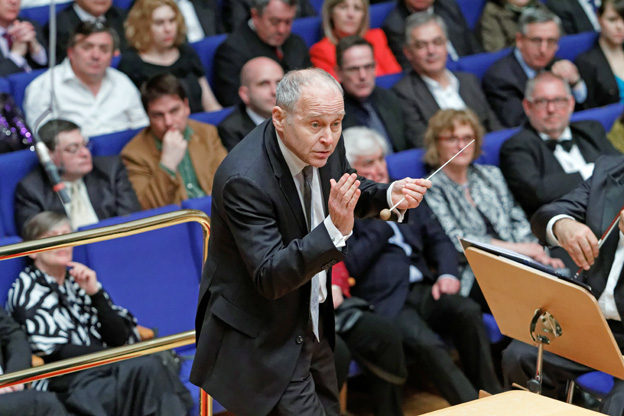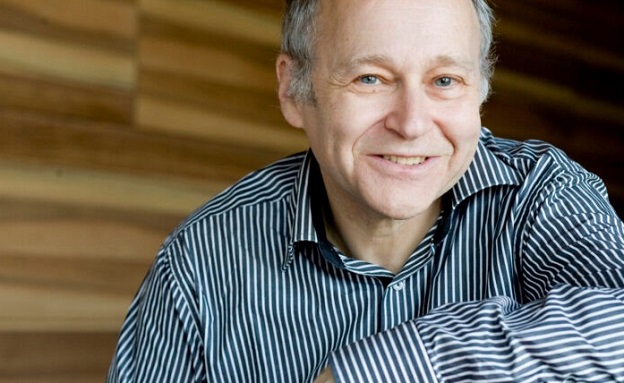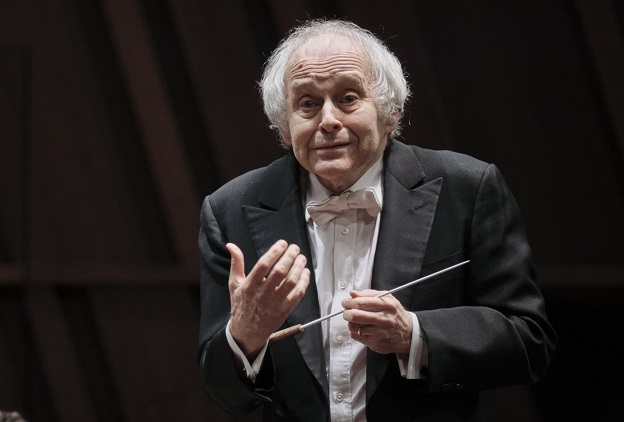In several interviews, you have said that you are not overly concerned about the prizes, but rather look to the future. What motivates you?
I’m certainly happy to be recognized for my work, but it’s very foreign to me to give my mind a rest or to settle down. I often find myself listening to my older recordings and just getting angry with myself that I should have done certain things differently, but once I let go of them, I can’t change them. In the 80s and 90s I recorded all the Haydn symphonies, and when I listen to them I get the same feeling.
Most recently, you have re-recorded the late Haydn symphonies for Naxos, which the ICMA international jury has now welcomed with great enthusiasm. Are you satisfied with the result?
I don’t believe in defining right and wrong. For me, the important thing is that we were able to capture a very interesting and personal interpretation with the Danish Chamber Orchestra. In fact, I was lucky enough to be able to make my own remake, which allowed me to do many things differently, but I am convinced that in five years’ time I will not like this recording either. What you hear now is the truth of the current phase of my life.
What did you change?
Shakespeare’s text is sacred, but Hamlet’s monologue can be spelt out in many different ways. There is no such thing as playing the notes without any conviction, and something will come of it. As a performer, I have to live with what the composer has allowed me and make each note my own conviction. This is particularly true for music of the 18th and 19th centuries. Different performances of the same piece of music affect people differently. Even with Mahler, who was very careful to write everything down precisely in the score, there is still the freedom to make a particular note just a little stronger or softer, or to choose exactly which one is emphasized. If a conductor has nothing to say about these fine tunings, the music simply becomes boring. It’s very interesting, by the way, how much more firmly Mozart and Beethoven’s works are in the public consciousness. If their works are not interpreted, the most that can be said of the performance is that it was uninteresting, but if this is the case with Haydn, we tend to say that his works are not up to the standard of the other two. That in itself is a really big mistake.
How did you come to the realization that you needed to re-record certain works?
I’ve been working with the Danish Chamber Orchestra for years, with the same members and a repertoire that they play exclusively with me. It is because of this special situation that we are able to build on and learn from previous rehearsals and performances over time. It’s a kind of relationship that they are very receptive to, and many times the orchestra members point out to me that I asked for this and that in a different way before. In the beginning we started with Mozart operas, then came the orchestral works, and then we recorded all the Beethoven symphonies, which led to the feeling that we should also work on Brahms’ works. And as for Haydn, after we had played through the aforementioned repertoire, I had to realize that I now think differently about certain musical arrangements. Don’t get me wrong, it’s not that what we had previously created with the Austro-Hungarian Haydn Orchestra is not up to scratch, but that we simply have a different starting point. The concept was once to combine the tradition of Austrian performance with a more fiery Hungarian approach to music, and now it’s about building music from scratch, ignoring the traditions that came before.
On the new album, the jury emphasizes the high level of expression and the sophisticated sense of humor, saying that « ideally, this is how one imagines a Haydn performance ». Is there really an ideal performance?
Haydn was full of surprises. In his day, audiences loved it, they shouted, they celebrated, the atmosphere at a concert was like a rock concert today. I am convinced that the essence of a true-to-the-time performance should not be that the music sounds exactly the same, but that it has exactly the same effect. A period performance is no good if it leaves people cold, so I like to aim for the power of the music, what it evokes in the audience. Haydn was very creative, he put a lot of ideas and jokes into his music, but they are usually not on the surface, they have to be unraveled.
We have already touched on some of this, but can you say that Haydn, Mozart, Beethoven and of course Wagner play a prominent role in your life?
If you look at it, it’s all Viennese music, and in the case of Wagner, at least it’s based on it. But I am not sure it was a conscious choice. I was exposed to a lot of Italian opera in my youth, and it’s still very close to my heart. I have conducted Verdi in many places, including La Scala in Milan, Vienna and the Metropolitan in New York, and let’s not forget that Otello is the opera I have conducted most often. To create an opera is a much bigger task than a symphonic work, simply because it requires not only a professional orchestra but also at least four or five excellent singers.

Adam Fischer with the Bilkent Symphony Orchestra, ICMA-Gala in Ankara 2015. He won a prize for the Dacapo box with Mozart’s complete symphonies with the Danish National Chamber Orchestra (c) Aydin Ramazanoglu
Last year you celebrated your 75th birthday. Can’t an occasion like this be about looking back?
People are often thinking about their own lives. I always come to the conclusion that I don’t know how long it will last, but I still have work to do. I’m constantly coming up with new ideas, and that’s a problem, because I want to do all of them. In March, for example, I’m conducting the Vienna Symphony Orchestra at the Musikverein, performing a French programme, including Fauré’s Pelléas and Mélisande. Normally, I don’t conduct French works, but I was wondering how long I could wait.
Three years ago, the ICMA jury honored you with its Lifetime Achievement Award. Does that mean you still feel something is missing?
If I didn’t have plans, I wouldn’t be myself, but I could also give up and just improve on what I have achieved so far. I often think about what it was like when I started out and the journey a young person has to take today. It has been suggested that I should give lectures, that I should teach, that I should speak to young people. I must admit that I am increasingly concerned about this, because I know how many misconceptions there are about conducting and sooner or later I might actually bring myself to say something about it, about what the purpose of conducting is, because it’s certainly not about being at the center.
You have been principal conductor of the Düsseldorf Symphony Orchestra for many years. The ensemble also won an ICMA Award this year. Are you proud?
I really enjoy working with the orchestra, which I now have the opportunity to do for another five years. The line-up here is traditional, as there are several conductors working with them, so it’s not as sophisticated, but I can be really proud that we have recently recorded the Mahler symphonies and are going on a tour of China with the Ninth. I feel that something has begun with them, a bit like when those first Haydn symphonies were recorded thirty years ago. By the way, I will be performing with them at the ICMA Gala Concert on 19 March. We are preparing a special programme reflecting on the winners of the categories.
What are your main priorities for the near future?
Next week I will be conducting Mozart in Hamburg, where the opera Mitridate, King of Pontus will be performed for the first time. I am also very honoured to have been invited by the Vienna Philharmonic to give a joint concert every year until 2028 as part of the Mozart Week in Salzburg, and in the meantime I am working on new projects with the Danish Chamber Orchestra, including showing Austrian audiences how exciting and valid our understanding of Viennese classical music is. Last but not least, I have been conducting at the Vienna Opera for forty-five years and will continue to do so. There will also be Die Zauberflöte and Richard Strauss, because although the world has changed a lot, the Vienna production of Der Rosenkavalier is still being staged in the same way, and with unbroken success.
























